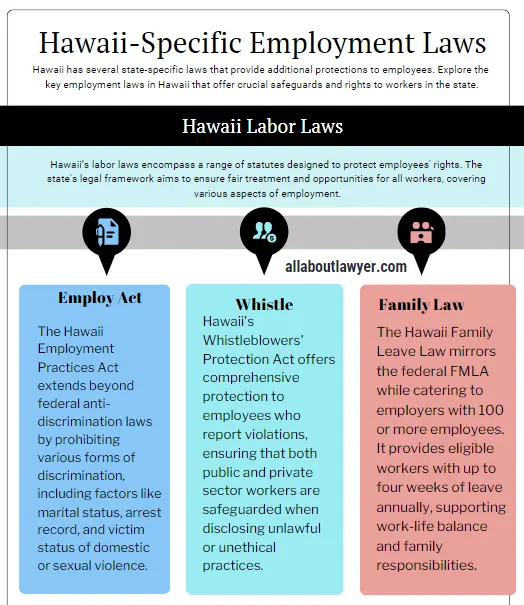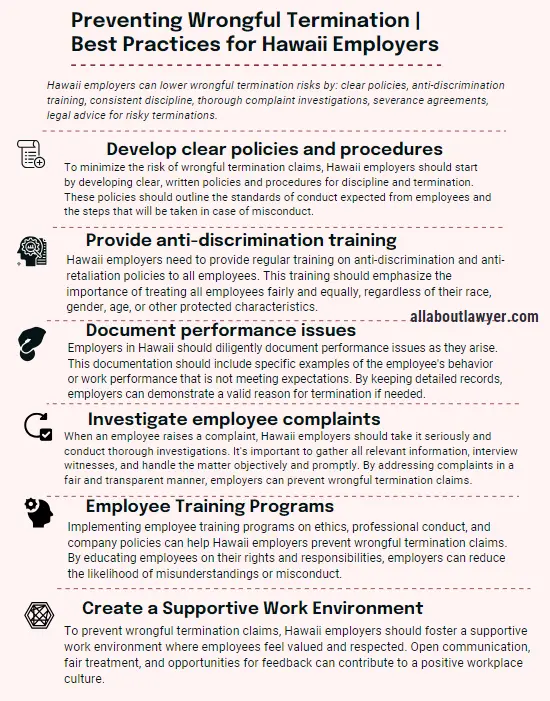Wrongful Termination in Hawaii Understanding Employee Rights and Legal Protections in the Aloha State
In the picturesque Aloha State, where the spirit of “ohana” (family) often extends to the workplace, the issue of wrongful termination can feel particularly jarring. While Hawaii is known for its laid-back atmosphere and strong sense of community, employees in the state are not immune to unjust dismissals. This comprehensive guide delves into the intricacies of wrongful termination in Hawaii, offering valuable insights for both employees and employers navigating this complex area of employment law.
Table of Contents
Understanding At-Will Employment in Hawaii
Like most states in the U.S., Hawaii follows the doctrine of at-will employment. This principle allows employers to terminate employees for any reason or no reason at all, as long as the termination does not violate specific laws or contractual agreements. However, the at-will doctrine is not absolute, and there are several important exceptions that can form the basis of a wrongful termination claim.
Exceptions to At-Will Employment
1. Discrimination:
Firing an employee based on protected characteristics such as race, color, religion, sex, sexual orientation, age, disability, or national origin is illegal under both federal and Hawaii state laws.
2. Retaliation:
It is unlawful to terminate an employee for engaging in protected activities, such as filing a complaint about discrimination or unsafe working conditions.
3. Public Policy Violations:
Dismissing an employee for refusing to engage in illegal activities or for exercising legal rights (e.g., voting, jury duty) is considered wrongful termination.
If an employment contract, whether written or implied, specifies terms of employment or dismissal, violating these terms can be grounds for a wrongful termination claim.
5. Whistleblower Protection:
Hawaii law protects employees who report violations of laws, rules, or regulations to appropriate authorities.
Hawaii-Specific Employment Laws
Hawaii has several state-specific laws that provide additional protections to employees:
1. Hawaii Employment Practices Act:

This law expands on federal anti-discrimination protections, including prohibiting discrimination based on marital status, arrest and court record, and domestic or sexual violence victim status.
2. Hawaii Whistleblowers’ Protection Act:
This statute offers broader protections than federal law, covering both public and private sector employees who report violations of law or contract to their employer or a public body.
3. Hawaii Family Leave Law:
Similar to the federal Family and Medical Leave Act (FMLA), but applies to employers with 100 or more employees and provides up to four weeks of leave per year.
4. Hawaii Payment of Wages Law:
This law sets strict requirements for the timing and method of wage payments, and terminations related to wage disputes may be scrutinized under this statute.
Common Scenarios of Wrongful Termination in Hawaii
1. Discriminatory Firing:
Despite Hawaii’s diverse population, incidents of race-based or gender-based terminations still occur, particularly in industries like hospitality and tourism.
2. Retaliation for Workers’ Compensation Claims:
Employees in physically demanding jobs, such as agriculture or construction, may face retaliation for filing workers’ compensation claims.
3. Whistleblower Retaliation:
In industries like healthcare or government, employees who report regulatory violations or misuse of funds may face retaliatory dismissal.
4. Breach of Employment Contracts:
High-level executives or specialized professionals may have employment contracts that, if violated, can lead to wrongful termination claims.
5. Constructive Discharge:
This occurs when an employer makes working conditions so intolerable that an employee feels forced to resign. It’s particularly relevant in Hawaii’s close-knit work environments where social pressure can be significant.
Steps to Take if You Suspect Wrongful Termination
If you believe you’ve been wrongfully terminated in Hawaii, consider taking the following steps:
1. Document Everything:
Keep a detailed record of events leading up to and including your termination. This includes emails, performance reviews, and any communication regarding your dismissal.
2. Review Company Policies:
Carefully read your employee handbook and any employment contracts to ensure your termination doesn’t violate stated policies or agreements.
3. File an Internal Complaint:
If your company has a grievance procedure, consider using it to address your concerns formally.
4. Contact the Hawaii Civil Rights Commission:
For discrimination-related terminations, you may file a complaint with this state agency.
5. Consult an Employment Attorney:
An experienced Hawaii employment lawyer can evaluate your case and advise on the best course of action.
6. Consider Alternative Dispute Resolution:
Hawaii encourages mediation and arbitration as alternatives to litigation. These methods can often lead to quicker and less costly resolutions.
Proving Wrongful Termination in Hawaii
Establishing a wrongful termination case in Hawaii typically requires demonstrating that:
1. You were terminated from your job.
2. The termination violated specific laws, public policy, or contractual agreements.
3. There is a causal connection between the protected activity or characteristic and your termination.
Evidence that can support your case includes:
– Direct evidence of discrimination or retaliation (e.g., discriminatory statements by supervisors)
– Circumstantial evidence (e.g., being replaced by someone outside your protected class)
– Documentation of your job performance and disciplinary history
– Witness testimonies from colleagues or former employees
– Evidence of disparate treatment compared to similarly situated employees
Employer Defenses in Wrongful Termination Cases
Employers in Hawaii may assert various defenses against wrongful termination claims:
1. Legitimate Business Reasons:
Demonstrating that the termination was based on poor performance, misconduct, or economic necessity.
2. Lack of Knowledge:
Arguing that they were unaware of the employee’s protected status or activities.
3. Consistent Application of Policies:
Showing that the termination was consistent with company policies applied equally to all employees.
4. After-Acquired Evidence:
Discovering misconduct after termination that would have justified the firing anyway.
5. Statute of Limitations:
Arguing that the claim was not filed within the required time frame (generally 180 days for filing with the Hawaii Civil Rights Commission).
Remedies for Wrongful Termination in Hawaii
If a wrongful termination claim is successful, potential remedies may include:
– Reinstatement to the former position
– Back pay and benefits
– Front pay (future lost wages)
– Compensatory damages for emotional distress
– Punitive damages in cases of egregious misconduct
– Attorney’s fees and court costs
The specific remedies available will depend on the nature of the claim and the laws under which it is brought.

Preventing Wrongful Termination | Best Practices for Hawaii Employers
To minimize the risk of wrongful termination claims, Hawaii employers should:
1. Develop clear, written policies and procedures for discipline and termination.
2. Provide regular training on anti-discrimination and anti-retaliation policies.
3. Document performance issues and follow a consistent progressive discipline process.
4. Conduct thorough investigations of employee complaints.
5. Consider offering severance agreements in exchange for release of claims.
6. Consult with legal counsel before terminating employees in potentially risky situations.
Conclusion
Wrongful termination in Hawaii is a complex issue that requires careful navigation of both federal and state-specific laws. While the at-will employment doctrine provides employers with significant discretion, there are important exceptions that protect employees from unjust dismissals. Understanding these protections and the proper steps to take in case of suspected wrongful termination is crucial for both employees and employers in the Aloha State.
By fostering fair employment practices and addressing terminations with transparency and legality, Hawaii can maintain its reputation as a place where the spirit of “aloha” extends to all aspects of life, including the workplace. Whether you’re an employee facing potential wrongful termination or an employer seeking to avoid such claims, consulting with an experienced Hawaii employment law attorney can provide invaluable guidance in this nuanced area of law.
Related Articles For You:
Wrongful Termination in Hawaii
Elon Musk beats Ex-Workers X Lawsuit Secures Landmark Victory in $500 Million Severance Lawsuit
FAQs
Q1: How long do I have to file a wrongful termination claim in Hawaii?
A1: The time limit, or statute of limitations, for filing a wrongful termination claim in Hawaii depends on the specific legal basis for your claim. For discrimination claims, you generally have 180 days to file a complaint with the Hawaii Civil Rights Commission. For other types of claims, such as breach of contract, you may have up to six years. It’s crucial to consult with an attorney promptly to ensure you don’t miss any deadlines.
Q2: Can I be fired for filing a workers’ compensation claim in Hawaii?
A2: No, it is illegal for an employer in Hawaii to terminate you solely for filing a workers’ compensation claim. This would be considered retaliatory termination and is prohibited under Hawaii law. However, employers may still terminate employees on workers’ compensation for other legitimate reasons unrelated to the claim.
Q3: Does Hawaii recognize implied employment contracts?
A3: Yes, Hawaii courts have recognized implied employment contracts in certain situations. These can arise from verbal assurances, company policies, or a consistent pattern of practice by the employer. However, proving the existence of an implied contract can be challenging and often requires substantial evidence.
Q4: What is considered constructive discharge in Hawaii?
A4: Constructive discharge occurs when an employer makes working conditions so intolerable that a reasonable person would feel compelled to resign. In Hawaii, to prove constructive discharge, you generally need to show that the working conditions were unusually adverse and that the employer either intended to force you to quit or could have reasonably foreseen that you would quit as a result of those conditions.
Q5: Can I be terminated for discussing my salary with coworkers in Hawaii?
A5: No, under both federal law (National Labor Relations Act) and Hawaii state law, employees have the right to discuss their wages with each other. Terminating an employee for engaging in such discussions could be grounds for a wrongful termination claim. This protection applies to most private sector employees, whether they are in a union or not.
About the Author

Sarah Klein, JD, is a former employment attorney who has advised clients on wrongful termination, workplace discrimination, wage disputes, and employee rights. At All About Lawyer, she writes practical, legally sound guides to help workers understand labor laws and stand up for fair treatment at work.
Read more about Sarah
